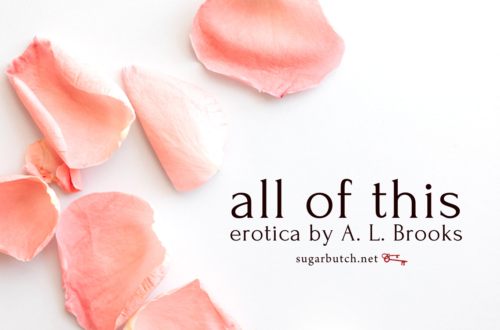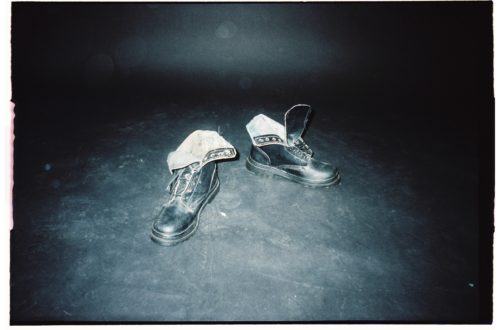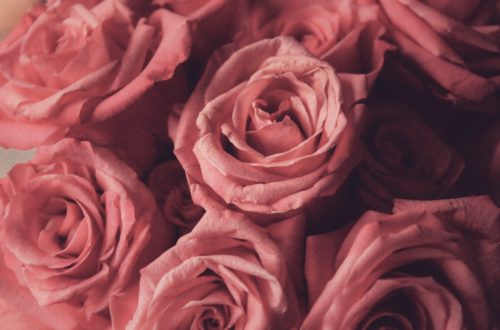It is no secret that I like identity categories. Anyone who has read around on Sugarbutch knows I identify strongly with some of these labels – hell, even if all you ever read here is the masthead, my chosen categories are listed right there – kinky queer butch top – which is also the chronology of their development.
Kinky and queer came easily to me. Well, let me clarify. Not easy, exactly, but without much social stigma. It took me a few years to get out of the relationship with my high school boyfriend and come out, for example, but once I was out, I was out and didn’t really look back. Kinky, too, was generally easy to adopt.
Butch was much harder for me. I’ve written about that some, and many folks have pondered and asked me about the amount of work that I seem to put into it, as if questioning whether or not all this work is worth it. These questions asked to me are often followed by things like I just don’t get it, I am what I am, I’m just me, I don’t fit any one category.
Two things about that.
First, I like the work. I get off on it, I find it hot and engaging and fascinating, and interconnected to so many of my interests.
Also, I don’t fit into any singular thing either. I have a long string of identity labels – and even still, the whole is more than the sum of its parts, right? So even if I told you I am also a pianist, a photographer, a yogi, an Ears with Feet, you still don’t actually know me. You have to meet me, interact with me, see me in different situations, hear my history and future aims.
I wouldn’t ever force labels on anyone else. Call yourself or don’t call yourself whatever you like; just because I feel strongly connected to these things doesn’t mean I think you have to. I study post-identity politics, I understand that identity categories have issues.
I recognize that I am in the minority here, and even that I have a gender fetish. I love these categories and language that they provide when discussing gender. It is tightly connected to activism, for me, and I strongly believe in the ways that gender diversity is liberating and subversive. (Back to that in a minute.)
I run into many people, lesbian and queer women especially, who say, “I don’t fit in,” “I don’t know what I am,” “I don’t want to limit myself,” “am I femme/butch if I _____,” “I’m not really femme/butch, look at the ‘real’ femmes/butches out there, I don’t look like them.”
I would never presume to put my gender fetish on you. If I want to reject the labels and categories, or if you want to call yourself and your gender “blue” or “leopardish” or “the eleventh hour” or nothing at all or whatever, I don’t care. Do whatever you like, do whatever feels good to you.
And, if it feels good to you, I will gladly talk to you about it, explore it, lay down some of my concepts like the gender galaxy and the dress-up test and my theories on separating gender from personality.
The people I’ve done this with have generally been very interested in gender play and categories and theory, but were wary of being policed by the community about it. They don’t feel femme “enough,” or like a “real” butch.
Quite often, I find that the people who want to talk to me about this stuff want to identify with a gender identity category, but fear the social policing. Maybe it’s just part of human nature – to organize, categorize. I’ve said before, I don’t think one should conform to a label – any label, especially not gender – I think the label should conform to you.
All that said: generally, I do want to encourage more dykes to adopt the labels of butch femme – if they want to – primarily because I know how liberating it has been for me.
But I also want to encourage gender identity labeling, specifically butch/femme dynamic – because the primary contrary argument I hear to these labels is that they are limiting.
And this is where the activism comes in: I believe we need to go inside these labels and expand them.
We’ve actually done a pretty good job re-valuing feminine/female/femme in this culture, which has (in my opinion) everything to do with the three waves of the women’s liberation movements, and, especially, the Third Wave feminism of the 80s and 90s that questioned the notion that gender causes oppression, which was a major assertion of the Second Wave, and instead said that hierarchizing the male/female binary meant that femininity was inherently defined as “not as good as,” which should be examined and changed.
And, I would argue, generally, it has.
For more on that I suggest Manifesta by Jennifer Baumgardner and Amy Richards – a very readable feminist book covering third wave politics and theories.
But: We have yet to have a gender re-valuing for men and masculinity. It is starting – and the fags and butches and drag kings and FTMs are on those front lines, for sure – but it is far from full force. This is, I think, particularly why there are so many more femmes than butches out there in the queer communities these days – to quote Team Gina, “there’s like one of them and thirty of us.”
We need this. Men and fags and butches and FTMs and people need a revaluing of masculinity.
And this is why I want to encourage more lesbians to identify as butch – because the more who do, the wider the understanding of the label becomes, and the more range the label has. If we say, I’m not that, because butch is this tiny limited thing, and that’s not me, then we are allowing it to be this tiny limited thing instead of going inside of it and exploding it, opening it up.
And that’s one way to add more acceptance to the range of masculinity.




Hersband here. Really glad the wife pointed me to your blog. I agree 100%. Butches need to stand tall and proud and be a presence. I believe this to be true for not only butches but all non-traditionally masculine folks. Even those "straight" women in CT who are more masculine than my pops. Who says even straight women have to be feminine?
I'm going to add you to my google reader. I think I might also change my masthead to say something like kinky, queer, butch, flip-flop. LOL
Jero
thought provoking, Sinclair. Thank you.
Jan
Very well written. :)
I think I have to pass this on to the hersband to read. :D
Thanks, Sinclair. This really helped clarify things for me…though I’d still like to hear about the gender galaxy! It’s true that this issue strikes me because I don’t have a label for my gender, and I kind of want one. I like labels – the structure and freedom that comes with them. It’s something for me to ponder.
You should check out both To Be Real and What Makes A Man, both anthologies edited by Third Wave founder Rebecca Walker. Both books look at the fluidity of gender and WMAM especially looks at masculinity from a lot different perspectives, from MTF to Buddhist Lama…very good reading.
ITA with tongue-tied…you, of course, do rock.
I have to say that over the past month or so, reading you, and Miss Avarice and Essin' Em and now Tongue Tied as well, my head has been spinning with thoughts about gender and identity and sexuality (and, of course – fucking) and how it all flows together.
Having entered the queer community as a 32 year old only six months ago, and now having come into contact with this amazing community of writers and thinkers who express thoughts on these topics in such a profound way, I have found myself thinking and re-thinking my entire context for understanding myself and how I fit into the world, and how this world fits into me. I want to talk about it and write about it – but right now there's it's so multilayered that I don't even know where to begin.
I will say though, that as limiting as I first found the focus on labels in the queer community, I am now finding freedom in them. I get that I’m femme, and getting that has meant for me that I now feel greater freedom to play and relax within that classification. As a straight girl (or rather, I suppose, a queer girl who spent a long time playing straight) I had a pretty narrow definition of my own femininity and what it took (clothes, makeup, attitude, etc) to fill that role. Now, accepting that femme label, I know that I read as femme in a dress and heels, or in jeans, t-shirt and dirty tennis shoes, or even, in a vest and tie. That's because me being femme is not just about the outside…seems too basic, but for a person who struggled with identity for so long it is really quite profound.
Anyway, just wanted you to know that your writing has sparked something in me, and I hope to be able to articulate it better and start my own dialogue about it sometime soon.
you, of course, rock.
i dig that you get off on the labels and sorting and such. and i appreciate that you don’t get yer boxers in a wad that i don’t. i think maybe you and i do share enjoying messing with people’s ideas of what is within the range of “normal.” it amuses me to add unexpected depths to expected roles. so, yeah, maybe i do sorta get off on the labels & sorting, too. maybe you & i just have different spots & stripes, then, that we play with.
your post had me thinking about the advantages and disadvantages of living in a big, urban setting, having such a large, like-minded community. on the one hand, you have women sharing the spectrum nearer your experiences and worldview and motivations. on the other hand, you have less enlightened women sharing that spectrum who feel compelled to drag exclusivity and judgment into that community. not femme enough?! not butch enough?! petty follows ignorance around like a bratty kid sister. fuck that noise! how about just being you enough being enough for everybody else, too?
Wow! Thanks! I just stumbled upon your site recently. It has been a tremendous help. I don't think we had gender studies when I was in school.
When you said "I don’t think one should conform to a label – any label, especially not gender – I think the label should conform to you." That really spoke to me.
I wish I had something to add, but this is a good start!
i love this! getting into how people identify and what those identities mean to them, and why they choose *not* to identify in certain ways is absolutely amazingly fascinating. =) i think it's really interesting to see how differently people will perceive the same label, and what great lengths people will go to in order to stay in or out of a particular category.
i have a couple questions for you… firstly, i'm wondering what you think about this: there are quite a few people who argue that feminism is (in some cases, certainly not all) being taken too far, to the point where it is really hurting masculine-identified people. i had a (very, very brief) discussion about this with two lesbians, one who knew exactly what i meant, and agreed that this was happening, and one who disagreed completely (unfortunately, i couldn't think of any good examples, which sort of limited our ability to discuss it.)
and secondly, (i apologize if you've mentioned this before, i have the nagging feeling you have, but i can't seem to find it anywhere…) what do you think about labels such as boi/stud/etc. used by dykes who identify rather masculinely(?) who deliberately do not use the word butch? how would you articulate the differences there, or would you say that butch is a broad enough category to include those? myself, i have a sort of intuitive sense of a difference there (i'm mostly thinking of butch vs. boi), but it's not something i can easily describe. i'm really curious to hear your thoughts. =)
(sorry for such a long comment…. and if some of this doesn't make sense or whatever, it's probably cause i'm running on 4 hrs of sleep after an 8 hr shift =P, again, sorry)
i always enjoy reading your entries like this..
and i couldn't help smiling when you wrote 'Ears with Feet'.. <3
This is thick and hard and good. I've been meaning to take apart what I understand as gender, gender roles, femme-ininity and what resistance to or playing with these look like for me as someone located at the crossroads of many different identities that many may want to see as mutually exclusive. Since I need to not concede to various types of self hatred, I too have cultivated the collection and use of many labels which I feel freed by not controlled or limited by. All this to say, this is the second time I've come back to read. Early this morning I was holding the baby as he slept. But it was late and I couldn't concentrate. Now he's awake and wants to play. :) So, I'm coming back to read again when my one and a half year old is napping. Thanks for this. I saw your other blog, the one where you wanted to do research into (I think) queer sexualities. What happened with that work? Are you still doing it? Were readers interested? K. Gotta run.
I find your post very interesting to read because of your comment that there seem to be many more femmes out there than butches, and I'd have to disagree in some communities. I'm from a rural midwestern community, and honestly as far as queerness goes, it seems there's a greater quantity of butches to femmes, and I'm not quite sure why that is. I feel it has something to do with the rural-ness though. Where I live at the moment is in a much more urban area, and I see this pattern that you point out of more femmes than butches.
I also have noticed a greater reverence in my hometown for masculinity. Here I have heard on many occasions masculine women being referred to as icky/gross, which makes me really sad. Great post.
Jill – very good point. I think the femme-butch ratio tends to favor the femmes in specific situations – the yuppie lesbian crowds, probably – the 20somethings, the urbanites. I bet the rural factor is very different.
And, that said, even some larger towns have very different butch/femme dynamics – I used to live in Seattle and there are definitely more butches there than femmes. I have some speculations as to why, mostly having to do with the socially accepted dress code of the area …
Anyway, this brings up a lot of ideas, thanks for your note!